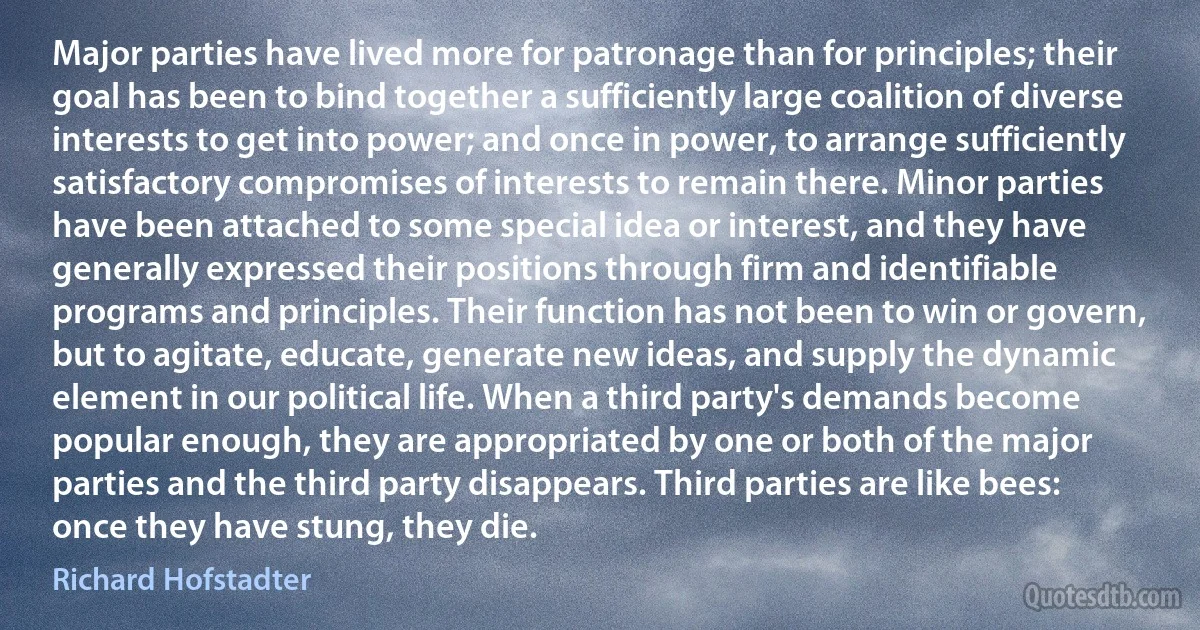
Major parties have lived more for patronage than for principles; their goal has been to bind together a sufficiently large coalition of diverse interests to get into power; and once in power, to arrange sufficiently satisfactory compromises of interests to remain there. Minor parties have been attached to some special idea or interest, and they have generally expressed their positions through firm and identifiable programs and principles. Their function has not been to win or govern, but to agitate, educate, generate new ideas, and supply the dynamic element in our political life. When a third party's demands become popular enough, they are appropriated by one or both of the major parties and the third party disappears. Third parties are like bees: once they have stung, they die.
Richard HofstadterRelated topics
bind coalition die dynamic element enough govern idea interest large life once party patronage power remain satisfactory sting third winRelated quotes
I have... instituted systematic, voluntary measures of cooperation with the business institutions and with State and municipal authorities to make certain that fundamental businesses of the country shall continue as usual, that wages and therefore consuming power shall not be reduced, and that a special effort shall be made to expand construction work in order to assist in equalizing other deficits in employment... I am convinced that through these measures we have reestablished confidence. Wages should remain stable. A very large degree of industrial unemployment and suffering which would otherwise have occurred has been prevented. Agricultural prices have reflected the returning confidence. The measures taken must be vigorously pursued until normal conditions are restored.

Herbert Hoover
Under the limitation of armaments treaty a large saving in outlay and a considerable decrease in maintenance of the Navy has been accomplished. We should maintain the policy of constantly working toward the full treaty strength of the Navy. Careful investigation is being made in this department of the relative importance of aircraft, surface and submarine vessels, in order that we may not fail to take advantage of all modern improvements for our national defense. A special commission also is investigating the problem of petroleum oil for the Navy, considering the best policy to insure the future supply of fuel oil and prevent the threatened drainage of naval oil reserves. Legislative action is required to carry on experiments in oil shale reduction, as large deposits of this type have been set aside for the use of the Navy.

Calvin Coolidge
It is not so much then for the purpose of undertaking to proclaim new theories and principles that this annual celebration is maintained, but rather to reaffirm and reestablish those old theories and principles which time and the unerring logic of events have demonstrated to be sound. Amid all the clash of conflicting interests, amid all the welter of partisan politics, every American can turn for solace and consolation to the Declaration of Independence and the Constitution of the United States with the assurance and confidence that those two great charters of freedom and justice remain firm and unshaken. Whatever perils appear, whatever dangers threaten, the Nation remains secure in the knowledge that the ultimate application of the law of the land will provide an adequate defense and protection.

Calvin Coolidge
Like any internationalist, I embrace Scotland's interdependence and the advantages that such interdependence confers. But in international relations - perhaps even more than the economic sphere - there are major advantages to pursuing an independent policy that promotes Scotland's global interests. Indeed it precisely because we live in an interdependent world - one where markets are integrating and information flow is unstoppable - a world where the reality of climate change acts as a daily reminder of our reliance on each other - that independence matters. Interdependence is a welcome fact of modern global politics. What matters in the Scottish national interest - above all else - are the terms on which Scotland engages. The equality of esteem, of authority between nations matters more now than it has ever done.

Alex Salmond
We of the Labour Party reject policies and measures which failed the nation then and will fail the nation now. We want to lay the foundations of a new and better Britain worthy of our great people. That is why we propose in the interests of the whole nation that the community should become the master of its economic progress and prosperity, instead of leaving control in private hands to be used primarily for the private advantage of a few. In short, we are standing for the common weal. But we need political power to enable us to give practical effect in Parliament to our great forward-looking policies. The nation has now the chance to give Labour the necessary power to do the job, and I appeal to the electors in the constituency which you are contesting to make certain of electing you to the new House of Commons.

Clement Attlee
